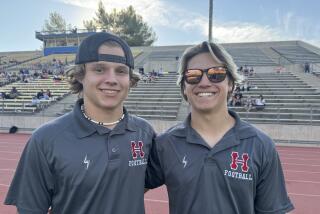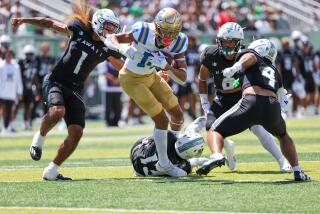Marsh’s New Lease on Life : Moorpark Receiver Resurrects Academic, Athletic Careers
As a wide receiver on the Moorpark College football team, Curtis Marsh knows that the best way from point A, the spot on which he lines up, to point B, the end zone, is not always a straight line.
The same might be said of his life.
Marsh, 20, has learned many lessons the hard way, which contrasts with the apparent ease with which he has become one of the most elusive receivers in junior college football.
Perhaps he can even parlay his natural physical talent and some acquired discipline into a prize that would have seemed impossible only two years ago--a scholarship to a four-year university.
“(Playing football) is to give direction to my life,” Marsh said, “because before, my life had no real direction, no real meaning, and this is a difference. This is a change. Now I’ve got something to work for.”
Marsh attended three high schools in Simi Valley--Royal, Simi Valley and Apollo (a continuation school)--but he did not earn a diploma or play football.
He came to the attention of Moorpark Coach Jim Bittner only because Mike Johnson, an academic counselor at Moorpark, had been impressed by Marsh’s athletic ability while watching him play basketball at Rancho Simi Park in Simi Valley a couple of years ago.
Although at first hesitant, Marsh enrolled at Moorpark in the fall of 1990.
It did not take Bittner long to like what he saw.
“You’d have to be walking around with a dog and a cane not to see what kind of an athlete he is,” Bittner said. “He’s very fast (4.43 seconds in the 40-yard dash). He’s a great leaper (33-inch vertical jump) and he’s strong (280 pounds in the bench press) for his size. He’s an electrical player.”
On Saturday, Marsh, a 6-foot-2, 200-pound sophomore, lit up Bakersfield with seven receptions for 116 yards and two touchdowns as Moorpark (4-1) routed the Renegades, 39-10, at Moorpark.
His first touchdown came on a 32-yard strike from quarterback Corey Tucker and gave the Raiders a 13-10 lead early in the third quarter. His second, a 35-yard reception, gave Moorpark a 23-10 advantage early in the fourth period.
Long gainers are his speciality. Marsh has 18 receptions for 399 yards (22.2 average) and three touchdowns this season. He had 14 catches for 342 yards (24.4 average) and three touchdowns as a part-time player last season.
“He’s one of the reasons why we’re passing more this year,” said Bittner, in his 14th season at Moorpark. “You need to get an athlete of his talent involved in as many plays as possible.”
Last season Moorpark gained 70% of its yards on the ground. All-American tailback Freddie Bradley rushed for 1,946 yards. But with Bradley now at Arkansas, the Raiders have gained 41% of their yardage through the air.
If not for a change in attitude a couple of years ago, Marsh would not be at Moorpark. He probably would still be working--”here and there,” as he puts it--with no real aim in life.
Few people would be content with such a situation and Marsh’s predicament was exacerbated by the need to care for someone other than himself. Marsh has a 3-year-old son, Curtis Jr., who lives with the boy’s mother, Traci Gibson, in Simi Valley.
“He made an about-face about two years ago,” said Jean Rocio, Marsh’s mother. “He just sort of matured all of a sudden. He called me one day, and said, ‘Mom, I’m enrolled at Moorpark and I’m going to play football.’ I was very happy to hear that.”
Marsh’s road to success at Moorpark was rough and circuitous--somewhat like one of his pass patterns.
He claims that a personality conflict with then-Royal Coach Tom West kept him off the Highlander football team as a sophomore and a junior, and he was academically ineligible during what would have been his senior season at Simi Valley in 1987. He finished his senior year at Apollo in 1988.
“I didn’t have the greatest attitude in the world,” Marsh said of his problems with West. “But football is football, and it’s a road for a kid to get his life in the right direction.”
Normally soft-spoken, Marsh talks passionately about sports as a vehicle for providing young people with direction--a commodity he lacked during most of his teen-age years.
Although his parents were divorced when he was 5, Marsh’s father, Leslie, kept in close contact until he died of lung cancer when Marsh was 12. “His father went to just about all his (youth) football games,” said Rocio, who has remarried. “When he died, it was the onset of a lot of Curtis’ problems.”
The death of his father was particularly troubling to Marsh because it happened so suddenly. The elder Marsh had not told his family--he had two other sons from a previous marriage--of his cancer until two weeks before his death. “I had no father figure, and that was the cause of some of my problems,” Marsh said. “You need that when you’re 12 because you’re going through a lot of changes at that time and you need someone there to show you what’s right and what’s wrong, and I didn’t have that.
“I had to learn things the hard way. . . . My mother and I are very close. She’s been a mother and a friend to me, and she’s tried to be a father, but you can’t. It’s not the same thing.”
Marsh, therefore, is adamant about spending time with his son every weekend. “I just love my son to death,” Marsh said. “But I’m also aware that he needs a father figure. I always want to be there for him.”
Curtis Jr. was born during his father’s senior year of high school. Marsh and Gibson lived together for two years and planned to get married, but they split up more than a year ago.
“It was just best for both of us,” Marsh said. “Her family was never really comfortable with the fact that I wasn’t a full-blooded black. And that made things hard on me because I was kind of confused about the whole thing for a while too.”
The son of a white father and a black mother, Marsh has shoulder-length, light brown hair, a mustache, long sideburns and wears an earring. His light complexion only added to his questions over his ethnic background.
“I consider myself black,” Marsh said. “But I wasn’t accepted by a lot of black people because I looked so white. I was raised in a black family, but a lot of people didn’t accept that because of the way I looked.”
Marsh said that he no longer worries about how others perceive him, leaving him free to concentrate on helping the Moorpark football team and earning an Associate in Arts degree.
His efforts on the football field have attracted the attention of recruiters from Florida State, Fresno State, South Carolina and San Jose State.
“He’s still got some things to learn,” Bittner said. “He’s very coachable, but he just gets frustrated at times. He wants to be perfect in every aspect of the game right now, and it just doesn’t work that way that quickly. You can’t be out of football for as long as he was and expect to come back and pick everything up in a season and a half.”
Marsh knows firsthand that learning is a complicated process--one in which a person sometimes learns best from mistakes.
More to Read
Get our high school sports newsletter
Prep Rally is devoted to the SoCal high school sports experience, bringing you scores, stories and a behind-the-scenes look at what makes prep sports so popular.
You may occasionally receive promotional content from the Los Angeles Times.






